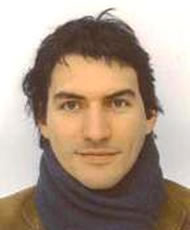David Walker MEng Electronics, 2002
Senior Electronics Design Engineer

David shares his career highlights since graduating from Southampton and advice for making the most of your time at university.
More than anything, I think that having a comfortable, relaxed, but keen attitude to interviews is probably the best way of getting the jobs you want.
What was your first job?
My first permanent position was with Apollo Fire Detectors in Havant, as "R & D Engineer".
What is your current role?
I currently work for Crowcon Detection Instruments Ltd. in Abingdon, Oxfordshire. I am one of three Senior Electronics Design Engineers.
What are your main responsibilities and duties in your current job?
I am responsible for designing, validating and supporting new Gas Detection Instruments for the industrial market. One of my instruments recently went on sale, as is showing good sales already. The main skills I've developed here have been in pushing a project through to its conclusion, without leaving any stone un-turned. Our products are required to be Intrinsically Safe, and the certification process is extremely challenging. More than anything, it teaches you to be rigorous in your thinking and understanding.
What has been your favourite job since graduation?
One of my favourite jobs was actually a summer placement at Philips Semiconductors in Southampton. I spent two summers there - in my third and final year at university and after graduation for a while. I was joint-winner of their Student Award, for a project I completed in their Systems Laboratory. It was a very free environment, with a lot of exciting projects going on at the time. In my time there, I saw the first demonstration of a Blu-Ray disc working on the bench, I saw a prototype voice-controlled Satnav (the size of a briefcase!), I saw people working on set-top boxes, before they were readily available, and I helped a work-experience student to modify a TV to make it voice-controlled. That was marvellous...except you could turn the volume up, but then you found that the TV couldn't hear your voice anymore and you had effectively blocked yourself out!
What have been some of the key moments in your career?
My first permanent role at Apollo was very important in my later career. I actually left there after about a year, to move home nearer to where I grew up. I spent the next few years looking around for a suitable job, gaining valuable experience but never really feeling at home. I worked for Xerox in Welwyn Garden City for a couple of years, but work was slow and it was clear that redundancies were on the way. When I was made redundant in 2009, I took advantage of the generous redundancy package to take stock of my career, and ended up working for Crowcon, which is in the same group (called Halma) as my first job at Apollo. It felt almost like coming home.
What are you most proud of?
Apart from the new product that I designed and brought to sale at Crowcon, I am most proud of the things I've done outside of work. I signed up as a STEM Ambassador, to help teach children about Science, Technology, Engineering and Maths, and I frequently take days off work (using my own annual leave allowance) to volunteer in local schools. I have also been involved in the Bloodhound SSC project, through the same scheme, which is an excellent way of enthusing youngsters to the possibilities of a career in Engineering.
What advice would you give to current and prospective students who desire a similar career to yours?
The most important thing I learnt when graduating was that the World doesn't owe me anything. I walked out of University with my Masters degree, expecting to find lots of available jobs at good rates of pay. The truth is, I had to work hard to find a good job. More than anything, I think that having a comfortable, relaxed, but keen attitude to interviews is probably the best way of getting the jobs you want. By all means change jobs if you feel that you've exhausted the possibilities of your current role, but remember to talk to your managers first - it could be that they have lots more interesting work available, and they're just waiting for somebody to offer it to. Don't be afraid to ask for more from your employers, but be prepared to work hard to get your dream job.
What advice would you give to prospective students looking to study your course at the University?
If I were starting University again, I'd get involved in more clubs and societies. I never really found a society I felt totally at home in, during the first year, and didn't bother trying to find out about them after that. It's a golden opportunity to make new friends, and learn new things outside of your normal environment. Oh, and go to as many public lectures as you can find! I went to two or three in my time there, but wish I'd gone to more.
What are your future career aspirations?
I plan to develop my role here at Crowcon, and I hope to become the company's authority on Gas Detection Electronics. By building up experience, and gaining the respect of my co-workers, I hope to be at the forefront of new product development for some time to come.